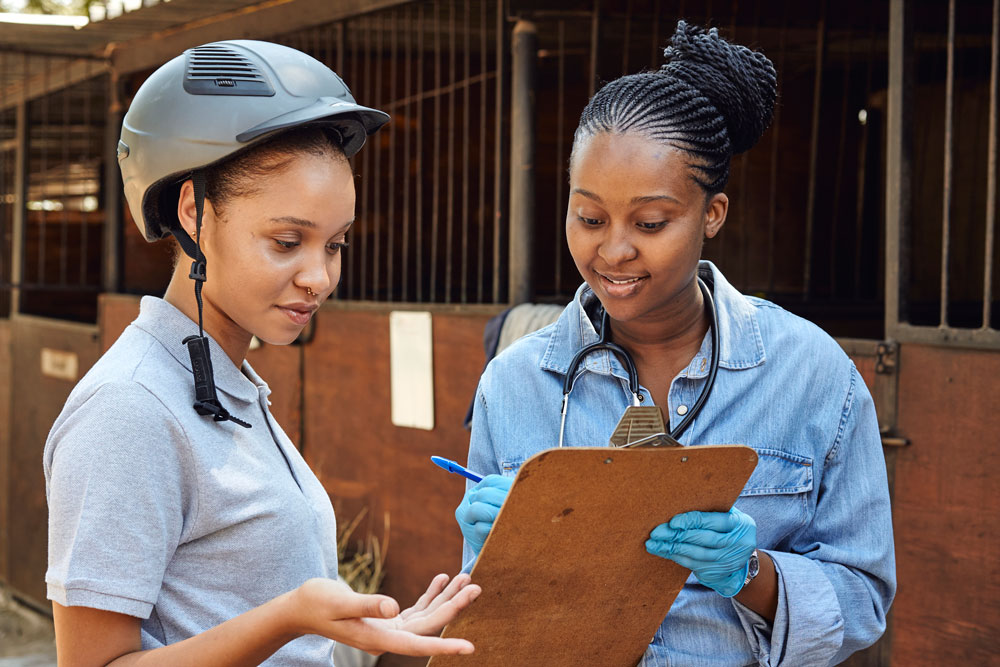
Editor’s note: We are focusing this series of articles on helping those who have equine businesses to understand diversity of all types and embrace inclusion of everyone who has an interest in joining the equine industry.
Diversity is focused on the makeup of your group, including demographics such as gender, race, ethnicity, age, sexual orientation and veteran status; inclusion is a measure of culture that enables diversity to thrive (adapted from an article on ADP.com).
The horse industry needs newcomers to thrive, and we need to include all types of people into the industry. Achieving the goal of increasing participation starts with creating stable where everyone feels welcome. Understanding bias, prejudice, stereotyping, racism and inclusion is the first step to creating a barn environment that treats all clients the same.
Adam D’Agostino, American Quarter Horse Association and American Paint Horse Association Professional Horseman, has devoted himself to exploring these topics and serving as an ally for underrepresented communities.
Here he explains bias, prejudice, stereotyping and racism.
Bias—D’Agostino said that bias stems from two different sources, a natural and a learned bias. Natural bias has foundation in personal preference and can oftentimes come from a person’s subconscious development.
For example, “I have a natural bias to Quarter Horses over other horses because they are prettier to me.”
Learned bias is developed by someone over time and is a result of their experiences and environment, he explained. For example, “I only like Quarter Horses because I have only owned Quarter Horses.”
Prejudice—Prejudice is formed from unrestricted bias and a lack of empathy toward someone who is different from you, according to D’Agostino.
For example, “I think Quarter Horses are the only breed worth owning because they are the prettiest breed, and I have always owned only Quarter Horses.”
“Bias, both natural and learned, lead to prejudicial feelings and actions,” D’Agostino said. “Prejudice leads to discrimination. Discrimination is not always overt and can often be an internal and not easily recognizable function within someone.”
Stereotyping—Recognizing stereotyping is trickier, and it’s not always an intentional aggressive behavior. Stereotyping is formed when someone has an opinion of another from a standpoint of preconceived bias, which can involve racism, sexism, ageism, ableism, etc., he explained.
“As stereotyping can be learned, it can also be mostly unlearned,” he said.
Racism—Racism is specific, has to do with racial inequity, and it is generally systemic. When looking at racism, D’Agostino said the word “privilege” must be considered.
“This word can often trigger many people to disengage because racism is intersectional with concepts like classism and sexism; and, racial privilege is not always obvious and tangible,” he said. “Essentially, racism involves one person having more privilege in a society on the sole basis of their race.”
Want to better understand bias, prejudice, stereotyping and racism? D’Agostino recommends:
- Seeking out diversity and inclusion training.
- Researching cultures different from yours and other groups of people different from you.
Here are some resources on diversity and inclusion from the Council on Accreditation you might find useful:
- Why Diversity, Equity, and Inclusion Matter for Nonprofits
- Harvard Implicit Association Test
- The MSW@USC Diversity Toolkit
- Racial Equity Resource Guide Glossary
- The Alliance Equity, Diversity, and Inclusion resources, webinars, and group discussion forums
- What’s the Difference Between Diversity, Inclusion, and Equity?
- Diversity, equity, and inclusion consultants share a script to respond to racist microaggressions at work so you know exactly what to say in the moment
- Urgently Looking for Anti-Racism Training for Your Company? Start Here.
- 11 Books To Read If You Want To Be A More Inclusive Leader
- Racial Equity Tools Library


